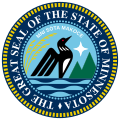| | |||||||||||||||||||||
November 5, 1996 | |||||||||||||||||||||
| |||||||||||||||||||||
Wellstone: 30–40% 40–50% 50–60% 60–70% 70–80% 80–90% >90% Boschwitz: 30–40% 40–50% 50–60% 60–70% 70–80% 80–90% Other: >90% Tie: 20–30% 30–40% 40–50% 50% No votes | |||||||||||||||||||||
| |||||||||||||||||||||
| Elections in Minnesota |
|---|
 |
The 1996 United States Senate election in Minnesota was held on November 5, 1996. Incumbent Democratic senator Paul Wellstone won re-election to a second term defeating Republican former senator Rudy Boschwitz in a rematch. [1]
Contents
- DFL primary
- Candidates
- Results
- Republican primary
- Candidates 2
- Campaign
- Results 2
- General election
- Candidates 3
- Predictions
- Campaign 2
- Polling
- Debates
- Results 3
- See also
- Notes
- References
Primary elections were held on September 10. Both Wellstone and Boschwitz were easily nominated.




